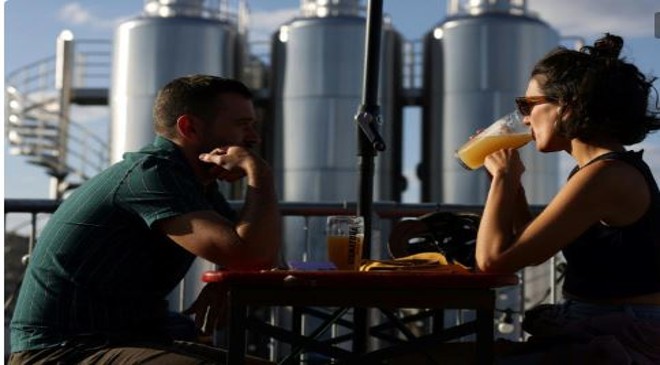British pubs could be forced to close because of massive increases in energy prices, leading industry figures said on Tuesday as they urged the government to step in.
Six of the country’s biggest pub and brewing firms said some pubs had seen a more than 300-percent hike in bills this year, as part of a wider cost of living crisis.
“In some instances, tenants are giving us notice since their businesses do not stack up with energy at these costs,” said William Lees Jones, managing director of the JW Lees pub group.
One pub tenant in the 2,700-strong Greene King group has seen a £33,000 ($38,600) increase in their energy bill this year, said chief executive Nick Mackenzie.
“While the government has introduced measures to help households cope with this spike in prices, businesses are having to face this alone, and it is only going to get worse come the autumn.
“Without immediate government intervention to support the sector, we could face the prospect of pubs being unable to pay their bills, jobs being lost and beloved locals across the country forced to close their doors,” he added.

Britain’s cost-of-living crisis has seen inflation soar to 40-year highs, with a growing number of strikes over wages that fail to keep pace with rising prices.
Last week energy regulator Ofgem announced an eye-watering 80-percent increase in gas and electricity prices for the average household from October, with even higher bills expected from January.

But the energy price cap does not apply to businesses.
The brewers — Greene King, JW Lees, Carlsberg Marston’s, Admiral Taverns, Drake & Morgan and St Austell Brewery — urged the government in an open letter to extend the cap to businesses.
Independent restaurants and takeaways — from fish and chips shops to Indian takeaways and kebab houses — have also voiced concern.
On Monday, more than 750 outlets said the increased costs were making hospitality “unsustainable”.
Pubs — a mainstay of British social life for centuries — have faced a torrid few years due to the slump in business due to coronavirus lockdowns and social distancing restrictions.
The number of pubs in England and Wales plunged below 40,000 for the first time ever in the first six months of this year, down more than 7,000 in a decade.
The British Beer and Pub Association, an industry body, said energy price rises, caused by hikes in wholesale costs and a squeeze on supplies due to the war in Ukraine, could damage the sector more than the pandemic if nothing is done.
– Energy intensive –
Craft or micro-breweries, which have enjoyed a boom in the last 20 years due to smaller start-up costs and a tax break for producing less than 4,000 litres a year, could also feel the brunt of the hikes.
Last year there were more than 2,400 craft breweries — five times as many as in the early 2000s — with companies such as Beavertown and Brewdog now household names.
But supply chain issues and inflation threaten to turn the tide. While 200 craft establishments opened in Britain last year, up to 60 closed, after some 160 were forced to shut due to the pandemic.
But supply chain issues and inflation threaten to turn the tide. While 200 craft establishments opened in Britain last year, up to 60 closed, after some 160 were forced to shut due to the pandemic.
“These breweries haven’t been doing a massive amount of money, just enough to get by,” Nik Antona, chairman of the Campaign for Real Ale (CAMRA), told AFP.
“Unfortunately brewing is quite a high energy intensive industry. You have to boil water. We’re going to see massive rises in energy bills.”
Supplies have also been squeezed by the war in Ukraine, one of the world’s leading producers of wheat and barley.
Josh Walker, production manager at the Exale craft brewery in Walthamstow, northeast London, is trying to remain positive.
SMEs such as his got creative during the pandemic, developing their online presence and launching home-brewing kits for those stuck at home.
Since the lifting of the lockdown, they have organised events to attract customers. Walker said Exale and others like it were still protected from inflation by forward contracts fixing prices of raw materials.
“A lot of our beer is sold at retail price in our tap room. That will protect us more than those selling only wholesale,” he added.
But Antona warned: “There’s going to be a limit on what you can pass on (to the customer).”









































